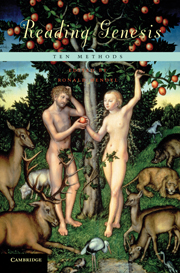Book contents
- Frontmatter
- Contents
- Contributors
- Acknowledgments
- Reading Genesis
- Introduction
- 1 Literature
- 2 Cultural Memory
- 3 Sources and Redaction
- 4 Gender and Sexuality
- 5 Inner-Biblical Interpretation
- 6 Rabbinic Interpretation
- 7 Interpretation in the Early Church
- 8 Translation
- 9 Modern Literature
- 10 Modern Theology
- Index of Biblical Citations
- General Index
- References
7 - Interpretation in the Early Church
Published online by Cambridge University Press: 05 June 2012
- Frontmatter
- Contents
- Contributors
- Acknowledgments
- Reading Genesis
- Introduction
- 1 Literature
- 2 Cultural Memory
- 3 Sources and Redaction
- 4 Gender and Sexuality
- 5 Inner-Biblical Interpretation
- 6 Rabbinic Interpretation
- 7 Interpretation in the Early Church
- 8 Translation
- 9 Modern Literature
- 10 Modern Theology
- Index of Biblical Citations
- General Index
- References
Summary
What benefit might an interpreter of Genesis obtain from the text's reception by early Christian readers? One would scarcely turn to Christian readers in an effort to reconstitute an original audience of Genesis, given that they were intellectually informed by a Platonist worldview, socially constituted by diverse Gentile communities, and textually dependent on the Septuagint translation. At the same time, early Christian interpreters stand quite distant from the community of contemporary scholarship. As Hans Frei has detailed, almost all interpreters before the modern period understood themselves to participate within “a single cumulative and complex pattern of meaning” that rendered the reality of Scripture concrete and actual for the believer. This precritical stance, as Frei called it, alienates the ancient Christian readers as far from today's scholars as they were from the Jewish readers of Late Antiquity.
This chapter situates the call and migration of Abraham in early Christian interpretation within the horizon of reception criticism. Reception criticism proposes to make interpretive use of all reader experiences, even readers alienated by cultural and temporal distance from the original production of the work. The aim in doing so is to generate an interpretive dialogue that expands the potential range of meaning that a contemporary reader might obtain from a text. This mode of engaging texts bears significant implications for how concepts of text, of reader, and of interpretation might be conceived. Consequently, the effort to expand the interpretive dialogue necessitates reflection on the reading process and the agents involved in that activity.
- Type
- Chapter
- Information
- Reading GenesisTen Methods, pp. 136 - 156Publisher: Cambridge University PressPrint publication year: 2010
References
- 1
- Cited by



